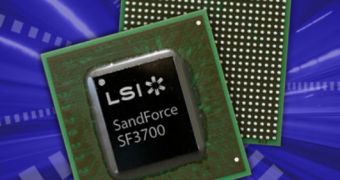SandForce is the SSD controller brand that allows for the highest transfer speeds on the market, which must be why LSI bought the company. There was still room for improvement though, which leads us to the main topic of this article: the SandForce SF3700 family of NAND controllers has been launched.
SandForce SF3700 allows for solid state drives featuring the PCI Express card form factor (PCIe x4 supported) and, of course, SATA 6.0 Gbps (SATA III) drives. In fact, the same chip can be used for both types.
On that note, the SandForce SF3700 family will probably be used more for enterprise and hyperscale environments than consumer drives.
Still, since 14nm NAND chips are catching on, there will definitely be some high-end consumer SSDs up for sale too, sooner or later.
Speaking of which, the performance is bound to go through the roof. In fact, instead of the controller determining it, it will probably be up to the NAND chips themselves to attain a good enough read/write potential to not limit the ICs when they start to work.
That, and the bandwidth of the chosen interface. Already SATA 6.0 Gbps SSDs can read and write at 550/540 MB/s, and that's with SandForce 2000 chips.
SandForce 3700 allow for 1.8 Gbps GB/s on PCI Express. We're not sure what that means for SATA units, but we can safely presume the best rates will go above the ones mentioned previously.
That said, the newcomers support M.2 SATA/SAS form factors in addition to 2.5-inch, Optimized DuraWrite Data Reduction (boosts SSD endurance), SHIELD error correction (extends flash memory life and enhances data integrity via flash-optimized low-density parity-check /LDPC), and enhanced RAISE technology.
Redundant Array of Independent Silicon Elements (RAISE) is like RAID but for SSDs, providing better performance and security with defense against page, block, and full die failures.
Finally, dual AES-256 encryption is included, keeping data safe without impacting a system's CPU performance.

 14 DAY TRIAL //
14 DAY TRIAL //